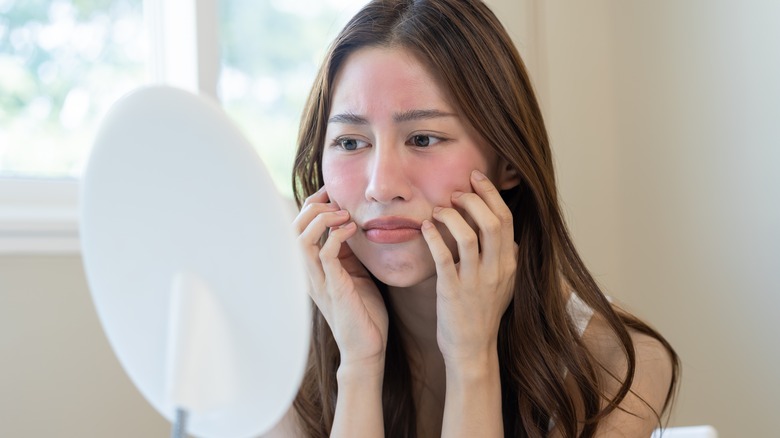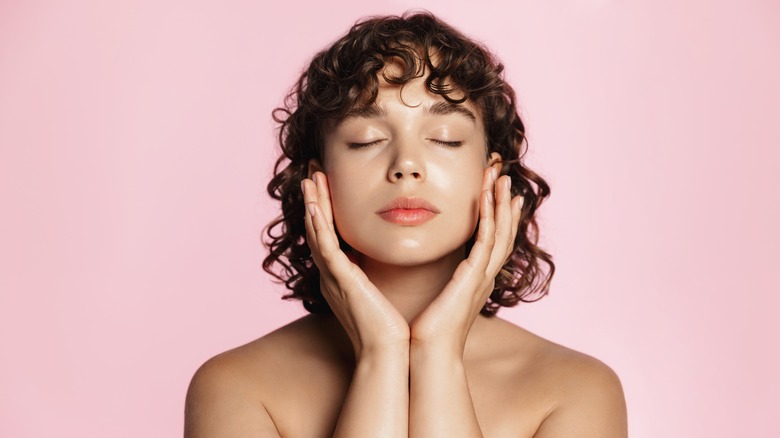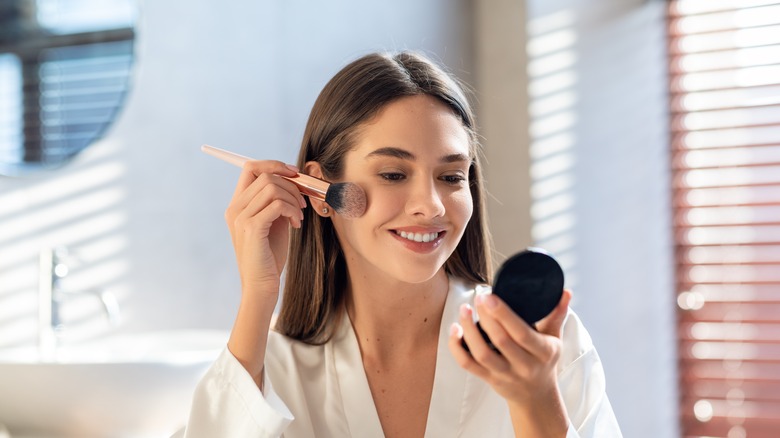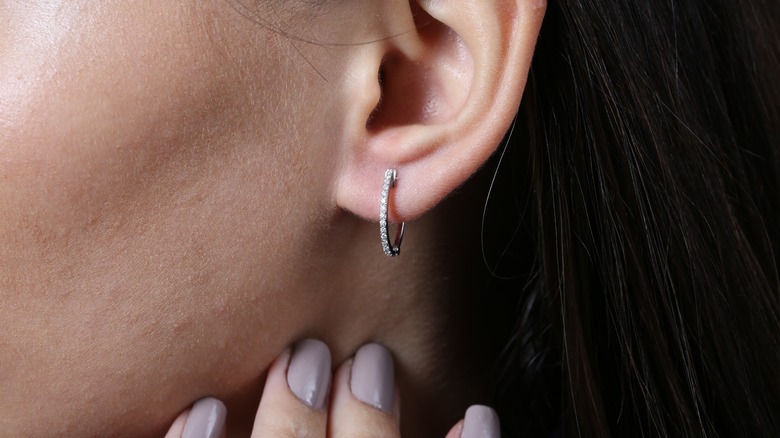Natural Ways To Treat Facial Eczema
Eczema is a condition that manifests in dry, itchy, red, and inflamed skin. Having it on your face can be doubly exasperating given the sensitive nature of facial skin, and also because it can cause self-confidence issues that can take a toll on your emotional health.
Per Verywell Health, facial eczema can mainly show up as three different kinds of dermatitis — atopic, contact, and seborrheic — and it typically appears around the eyes, cheeks, and chin area. Outside allergens, a history of eczema in the family, and an existing autoimmune disease might be particular culprits that cause facial eczema, and flares of the skin condition can occur due to factors like food triggers, stress, and hormonal changes as well.
Dr. Macrene Alexiades, a dermatologist, told Allure that even more care has to be exercised by people who develop eczema around their eyes. "Those with eczema around the eyes are more susceptible to certain eye problems such as conjunctivitis, inflamed cornea, and changes in the shape of the cornea, a condition called keratoconus," she said.
While it's advisable to get a doctor to look at your condition before you try anything at home, there are some natural things you can be doing to treat facial eczema.
Identify your triggers
The first step to treating facial eczema is to identify triggers. "Atopic dermatitis is genetic and flares can be triggered by dry environmental conditions, not moisturizing, stress, and allergies," Dr. Hadley King, who specializes in medical and cosmetic dermatology, told Allure.
Contact dermatitis could arise if your face comes into contact with some irritant. Per the National Health Service, your skin could be reacting to certain detergents, shampoos, conditioners, and fabrics. Exposing skin to the sun, temperature changes, and perspiration can also contribute toward facial eczema, reports WebMD.
Keep in mind that eczema symptoms and triggers will vary from person to person. The time between when you've come into contact with a possible trigger and the actual point at which the symptoms materialize may also vary, causing some confusion when it comes to pinpointing what sparked things off for you. You can work with your dermatologist to better understand what's causing the flares.
Mild is best
When it comes to natural ways of treating facial eczema, one thing you can do is take a look at all the different products you're using and see if they could be triggers.
Skincare specialist Dr. Anthony Rossi told Allure that he recommends going on a "product diet" to eliminate your triggers, starting with a gentle cleanser before you begin to slowly re-introduce what you were using before. Dry, scaly, and itchy skin can become all-too-familiar realities for people with eczema, and you may want to pay attention to moisturizing as well. Search for creams that are good for eczema. You could try natural, plant-based oils as well, such as pure coconut oil (via The Health Feed).
You might be surprised to find out that your nail care products — like nail polish — can also be triggering your facial eczema, so it might be a good idea to avoid visiting the salon to get your nails done and leaving them bare for a while, as Dr. Dray recommended in a YouTube video.
Look at your makeup and avoid fragrances
Wearing makeup when you have eczema requires a lot more care and caution. Fragrances and some of the metal compounds like nickel found in makeup products can become allergens that trigger facial eczema in some people, so minimizing or completely stopping the use of such products might be a good natural way to treat the skin condition, according to dermatologist Dr. Dray.
Preservatives like methylparaben and butylparaben can also irritate the skin, so try looking for cosmetic products with more natural ingredients (like grapefruit seed extract) instead, per WebMD. Spending a few more minutes at the supermarket to read through labels and fishing out the "fragrance-free" or "unscented" versions of your favorite brands might also be a good idea. Other ingredients to avoid include salicylic acid, essential oils, and mica, per Healthline. Even some common ingredients found in sunscreen can trigger facial eczema. While there are recommended sunscreens you can use if you have eczema, opting for mineral-based ones might be a good first point to remember.
You don't need to swear off beauty products if you have eczema, but you may want to exercise caution if you're going through a flare. Giving your skin time to recover after an eczema flare is also a good idea.
Take a look at your jewelry
You might be allergic to certain metals like nickel in your jewelry so it would be worth hitting pause on wearing earrings, necklaces, or other jewelry that are possibly coming into contact with your face for a while to see if that makes a difference, according to skincare specialist Dr. Dray.
There are ways to test jewelry before you purchase them to see if they contain any metals that could possibly trigger eczema, reports Derm Net. You can also go for alternative hypoallergenic materials like stainless steel or sterling silver. If you have a gorgeous pair of earrings that you really want to wear to an event (but you know they've got an irritant in them) you can try wearing them with a plastic cover coating the bits that come into contact with your ear lobes.
You don't have to avoid wearing jewelry altogether if you have facial eczema; you're just going to have to pay more attention to what it's made of.
Make lifestyle changes
Lifestyle changes like eliminating stress can be one other natural way to treat facial eczema. While, for some people, simply weaving meditation into their busy schedules might do the trick, for others there may be a need for more intentional methods like acupuncture or even hypnosis, per National Eczema. You could avoid taking on more than you can chew in the responsibilities department, going out for walks in nature, and cutting out alcohol, too, reports Medical News Today.
If you're already aware of common food allergens like seafood, dairy, or nuts, you can try cutting them out of your diet, and you can also try incorporating vitamin D, omega-3 fatty acids, zinc, and even probiotics to your diet, per Healthline.
Getting quality sleep might be more challenging if you're in the middle of a facial eczema flare, but not getting sleep can lead to stress. Take some time to create a comfortable sleeping environment for yourself — whatever that looks like for you — and help yourself to get more than seven hours of sleep per night (via Sleep Foundation).





